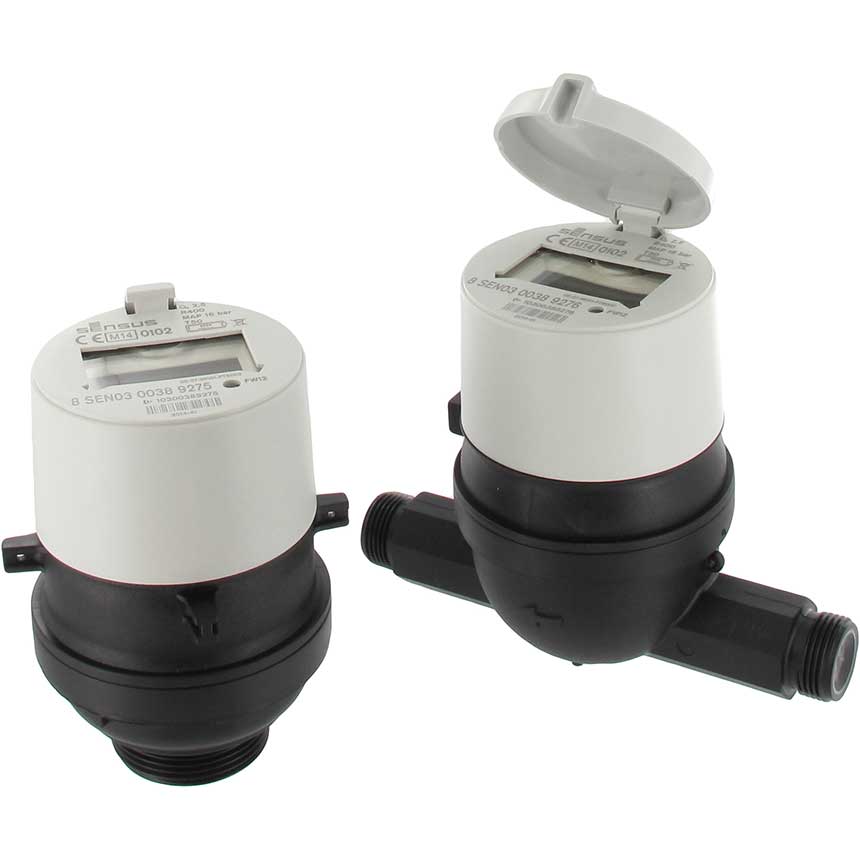Smart meters are prominent in water companies’ 2025-2030 business plans, in line with regulatory expectations for large-scale rollouts. In this Q&A, Andrew Welsh, Water Utilities Director at Xylem UK, discusses the sector’s readiness, and how the company is gearing-up for a rapid increase in demand.
What are the key benefits of smart meters for utilities and their customers?
Smart water meters collect and transmit water usage data in near real-time, enabling water companies to remotely monitor consumption on an hourly basis. Customers can track their daily consumption data and bill information – and, importantly, see how the two correlate – via a secure portal or app.
Smart meters are recognised as integral to water companies’ long-term water resource planning. This is both in terms of supporting per capita consumption reduction targets, by providing customers with clear insights into their water use and how they can make savings, and leakage reduction, by enabling real-time monitoring for more accurate measuring and faster detection of leaks.
This capability is particularly beneficial for customers who have a leak on their property – water companies can alert them to the high or constant usage almost immediately. With standard automated meter reading (AMR) meters, readings are taken once or twice a year, meaning customer leaks could go undiscovered for some time.
Having visibility and control across the entire network brings many more benefits, including more accurate customer bills based on daily readings, remote data collection instead of manual meter reads and data insights that provide a better understanding of consumption patterns and trends.
Looking ahead to when smart meters become ubiquitous, they may present water companies with more creative tariff options, to help encourage behavioural change especially in times of drought.
What is the current smart metering landscape in the UK?
Smart metering is here – and it is gaining momentum. As of September 2023, the Environment Agency reported that an estimated 14% of households in England had smart meters, a figure expected to rise to around 40% by 2030 – and to 65% by 2050. Implementation underpins the sustainability and demand reduction efforts of the UK water sector and is critical to securing our water future.

Xylem is a leading manufacturer of smart meter networks and solutions, through its Sensus brand, and is supporting utilities across the UK with their programmes. Water companies are at different stages of the smart metering journey, but they are all moving forward.
Some are undertaking small-scale trials, while others are progressing at pace with large-scale rollouts – Thames Water is eight years into what is the biggest smart water meter programme in the UK. Anglian Water’s programme began in 2020 and will see installation of 1.1 million smart meters by 2025. Xylem has supplied Sensus smart meters for both these flagship projects.
The Sensus brand combines smart water meters, advanced sensors and software analytics with multiple communication networks, including FlexNet, Xylem’s own long-range radio network, as well as cellular narrowband internet-of-things (NB-IoT) telecommunications.
What are the regulatory expectations around smart water meters?
Ofwat expects all water companies in England and Wales to consider smart meter solutions as the standard meter installation type in the 2025-2030 asset management plan period (AMP8). To build drought resilience faster, it has already allowed funding for the 2024 Price Review (PR24) to be accelerated for seven schemes, equating to 462,000 smart meters, from 2023-25 – that is in addition to projects already underway as part of the UK Government’s green economic recovery plan.
The Environment Agency has similar expectations, asking all water companies in England to install smart meters from 2025. The regulator says smart metering will be “an important enabler” for water efficiency and leakage reduction options set out in the sector’s water resources management plans.
How is Xylem managing the increase in demand?
From 2025, virtually all water companies will be installing smart meters. Xylem is getting ahead by investing in additional capacity and process optimisation at our manufacturing sites, including a state-of-the-art test facility at our factory in Laatzen, Germany. Across Europe we are gearing up to produces millions of meters annually to meet forecast demand with the accelerated roll-out of smart metering projects.
Xylem also works closely with its component and materials suppliers to ensure there is sufficient stock. Over the past three years, a global component chip shortage has been impacting technology manufacturers worldwide, but the good news is usual service has returned.
Being a large player in the market means we are well placed to ramp-up demand when required. All these measures put Xylem in a great position to meet the 2025 metering challenge.
Is the water sector ready for mass smart meter rollout?
Xylem’s water company partners are working hard to plan for forthcoming large-scale installations. Those with schemes already underway are very hands-on and able to share valuable insights and lessons learned with others across the sector.
When Xylem started supplying smart meters to UK water companies, we were mainly talking to operational managers. Now, partly due to the strong directives from regulators, the c-suite is engaging, including chief financial officers and chief executives. To have the benefits of smart meters recognised at the highest level in this way is vital – the CEO must be on board as early as possible for a successful rollout.
What training is required to manage a smart meter network?
Smart meters represent a completely new way of working, which is very different to how metering teams have worked in the past. There is likely to be a skills gap, and Xylem can support by providing additional training to utility customers and, as importantly, their installation contractors.
This is done via face-to-face training sessions, including hands-on scenarios and workshops. Providing customised training documentation and ensuring timely and ongoing support is also important to reduce wariness that can often be felt when a significant disruption occurs to usual practices which have been established over many years.
By working together, significant progress can be made. For example, Anglian Water installed over 1,000 meters per day, even during the covid pandemic, and put in place new operational procedures to streamline installation time to less than 15 minutes, from start to finish.
Is continuing to use AMR meters an option?
Some companies may ask whether they need to upgrade to smart meters when their existing processes with AMR meters work well. This is understandable – utilities are juggling multiple investment priorities and are particularly under pressure to improve the sewer network and cut pollution.
It is also recognised that reducing leakage follows the law of diminishing returns – the better your performance, the more cost is needed to sustain it and make further improvements. Historically, this may have been a reason to delay some actions.
However, water companies no longer have the option to delay. The smart meter direction statement from Ofwat is as strong as it is possible to be, without being a mandate. Any company not wanting to install smart meters would have to provide very strong evidence with its reasons for not doing so.
Are there concerns about the cost of smart metering?
Utilities recognise the need to focus on the total cost of smart meter ownership. Total cost models will deliver the best overall value. One of the biggest costs to utilities is sending engineers out to fix or replace equipment. Xylem’s focus is on supplying the best quality product – meters that will not need repairing or replacing – at a price that delivers the most value.
Research commissioned by Xylem’s managed network partner Arqiva and carried out by Frontier Economics and Artesia, shows that a coordinated rollout of smart water metering across England and Wales would deliver £4.4 billion in benefits to society against costs of £2.5 billion; a net benefit of £1.9 billion. Savings would come from improved leakage control and network management, and by avoiding the need for infrastructure for other water resources.
Xylem looks to develop innovative funding models to support utilities and can advise on options, such as reducing upfront capital expenditure and moving it to operational investment.
How durable are smart water meters?
Water companies are keen to learn about the technical reliability and durability of smart meters – can they withstand weather extremes, for example? Sensus meters are optimised for all conditions. Where they have been installed in parts of America, hurricanes and typhoons have been known to cause major network outages – but the smart water meters have remained operational.
If a utility can install a meter and not have to go back for 15 years, that is ideal and is what we work towards. Battery-life is also a big factor for consideration. We have specific engineers looking at battery technology, it is a big part of making a reliable meter. We have a very deterministic battery usage profile, built around the specific requirements of water meters, with expected operational life of the battery laser-etched onto the meter.
Companies will want to know when the batteries are to start running out – knowing where they are on the lifetime curve is important. Devices will be fitted in groups or clusters that are easy to manage or maintain, rather than scattered across a huge geographic area. This will avoid a scenario where a technician goes out to replace a battery on just one meter, when the next one along has five years left in it.
Utilities are acutely aware of meter longevity if purely for economic reasons, usually stating a minimum of 10 years or more operational life in their tenders, although the longer the better. However, often the correlation with ensuring communications power efficiency and effective battery management is not always fully considered. It will not make a difference over the first five years or so, but problems can arise further down the line without these factors being factored in. It should be a major part of designing the whole end-to-end system.
How should utilities prepare for the increase in data?
Smart metering involves the collection of multiple readings and alarm information for every meter every day – this adds up to a lot of information that needs to be stored and processed. Therefore, a significant investment must be made in the IT infrastructure – datacentres or cloud-service providers, with associated staff, security measures and additional training.
For companies planning their wider rollout, when should they engage their technology provider?
As soon as possible. There will be a number of technology-based decisions to be made and many stakeholders will be involved. Xylem has the experience, and proofs of concept and trials are a good way to understand the technology and we can help plan and explore those. The end-goal should be to integrate the right mix of smart water technologies and applications, to create a reliable, robust and future-proofed network.



